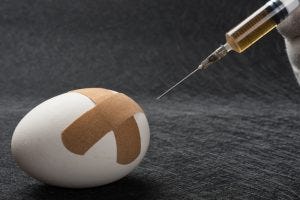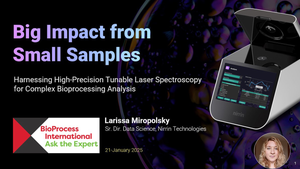
Seqirus’s vaccine offering for the 2019/20 season will be uniquely cell-base, but the firm says traditional egg-based production still plays a role in fighting influenza.
Provided each year by the World Health Organization (WHO) Global Influenza Surveillance and Response System (GISRS), candidate vaccine viruses (CVVs) are the basis for the development and production of seasonal influenza vaccines.
For the 2019/20 season, Seqirus has decided to use a cell-based CVV for all four influenza strains recommended by the WHO for its quadrivalent influenza vaccine, Flucelvax.

What came first, the cell-line or the egg? For flu vaccines, the egg, but this is all changing. Image: iStock/Freer Law
“While production for Flucelvax Quadrivalent will be exclusively cell-based for the 2019/20 season, traditional egg-based production process plays a critical role in the fight against influenza, and we continue to manufacture and distribute egg-based vaccines globally,” a Seqirus spokesperson told Bioprocess Insider.
Egg-based vaccines work and have been proven to be safe and effective,but there has been a shift to cell-based production to help ensure manufacturers can meet global demand for vaccines.
“There are several studies highlighting the potential benefits of cell-based influenza vaccines compared to egg-based vaccines. An analysis by S. Rajaram [presented at IDWeek 2018] evaluated antigenic match between the circulating H3N2 influenza virus and the cell-derived or egg-derived virus used in influenza vaccines and showed that egg-derived vaccine viruses have consistently higher levels of mismatch than cell-derived vaccine viruses.
“Two independent studies, one conducted by the US FDA/CMS and the other by Kaiser Permanente Northern California, found cell-based influenza vaccines to be more effective than egg-based influenza vaccines during the 2017/18 season.”
The firm would not, however, comment on the cost differences between egg and cell-based vaccine production and the knock on for payors and patients.
“We do not discuss pricing for future seasons, which is determined by a number of factors, including but not limited to anticipated demand.
Manufacturing expansion
Seqirus is a division of Australian firm CSL Limited, established in 2015 following CSL’s announcement to acquire Novartis’ global influenza vaccine business. The deal went through in 2016.
According to the spokesperson, the firm is the largest cell-based influenza vaccine producer in the world and supplied more than 20 million vaccine doses of quadrivalent influenza vaccine (QIVc) in the US during the 2018/19 influenza season.
And the firm continues to invest in process improvements and capacity to meet demand.
“We have scaled up our plant at Holly Springs significantly – quadrupling production over the last three years.” The $140 million (€124 million) expansion in North Carolina, announced last November, will create 120 jobs once completed next year.
“With continued investment in process improvement, such as the FDA approval of our next generation cell-based manufacturing process, and the $140 million expansion of our manufacturing facility, we are in a strong position to meet year on year increases in global demand.”
About the Author
You May Also Like

schedl_b_and_w.jpg?width=100&auto=webp&quality=80&disable=upscale)
schedl_b_and_w.jpg?width=400&auto=webp&quality=80&disable=upscale)





